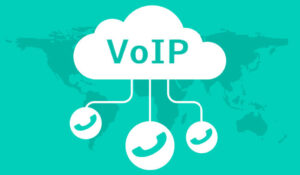If you had to point out one of the most important elements of customer service, what would pop into your mind?
If you thought of phone calls, you must be a mind reader, because I thought of it too! Customer service is the support you offer your customers—in every presential or remote contact—making phone calls an essential part of every business.
You might be picturing an open space with dozens of agents and phones ringing non-stop, but that is not necessarily how customer support works.
Technology evolves and so do we, and customers’ increasingly high expectations of availability and constant support brought new ways of calling—this is where VoIP, or Voice Over Internet Protocol, comes into place.
It is probably not the first time you hear about VoIP, but if you are wondering how it works and what benefits it brings to businesses, you are in the right place. Let’s dive into it:
- What is a VoIP caller and how does it work?
- What makes VOIP and regular phones different?
- What are the benefits of VOIP?
- Main uses of VoIP.
What Is a VoIP Caller?
A VoIP caller uses a VoIP phone system instead of a traditional business phone service. VoIP calls happen through the internet with the VoIP caller using a mobile phone or a computer to make calls. But how does it work?
VoIP, or Voice over Internet Protocol, is a technology that allows you to make calls over a broadband internet connection.
When you make a VoIP call, a VoIP system converts your voice—from a cell phone, office phone, or laptop—into a digital signal that gets transferred through a router. This signal is translated into a regular phone signal once it reaches the person you are calling.
The main difference between VoIP and traditional phone systems is that all you need to make a call is internet service and a mobile phone or a computer. For traditional phone calls, you need special hardware and cellular towers, which can limit your access to the service depending on where you are.
VoIP completely transforms the way we make calls, and it’s making its way into our daily use—did you know that when you use Skype, Messenger, or Whatsapp to make a call, you are using VoIP technology?
Businesses are also using VoIP to perform their day-to-day tasks, and it is rapidly becoming the first choice when it comes to business phone systems. VoIP systems are less costly than the traditional ones and don’t require the installation of special hardware or phones.
More importantly, they break down the geographical barriers, since employees can make calls from any point in the world, making VoIP phone systems perfect for companies that want to expand their business, or simply have employees working remotely or on the move.
VoIP vs Regular Phones: What Makes Them Different?
VoIP is already the top-of-mind alternative to traditional phone systems. But why? What differentiates this new technology from the traditional phone service we are used to?
The main difference between VoIP and traditional phone technology is that VoIP acts as a digital telephone service that uses the internet to make and receive phone calls instead of the traditional Public Switched Telephone Network (PSTN).
To put it in simple terms, this means that while landlines use wires and fiber optic cables to transmit sound, VOIP uses the internet—placing calls using Wi-Fi, data, or broadband instead of a physical phone line. This impacts the user of the two phones systems in terms of:
Accessibility
Both systems allow you to make calls worldwide, but traditional phone systems are often limited by the coverage phone companies offer, which impacts connectivity and voice quality. VoIP places calls from any point in the world, as long as the caller has a reliable internet connection.
Portability
Traditional phone systems rely on hardware and handsets, and either landlines or mobile phones. VoIP is able to work in the form of mobile or desktop apps, making it easier to use, install, and transport.
Costs
VoIP-based solutions are cheaper than traditional telecom solutions, not only due to hardware, installation, and maintenance costs but also when it comes to call pricing. VoIP usually operates on a flat-rate model, where all calls cost the same, regardless of where you are calling from.
On the other hand, the call pricing of traditional phone systems depends on various factors, including location, or if you are using a landline or a mobile phone.
Phone Numbers
VOIP telephone numbers are similar to regular phone numbers. The main difference is that VoIP numbers don’t have to be tied to a single location. This means anyone, including a business, can pick their number and area code. It is a big advantage for a business with multiple locations or working with remote staff.
Service Providers
While phone systems are provided by a telephone company, VoIP service is delivered by a VoIP provider. VoIP service providers establish calls but also offer complementary capabilities (such as routing of outgoing and incoming calls through existing telephone networks) and maintenance and support services.
What Are the Benefits of Using VoIP?
You can tell by now that VoIP differs from traditional telephone systems in many ways and brings huge benefits when it comes to accessibility, portability, and cost reduction. Moreover, VoIP can highly impact your business contact centre support and internal communications. These are the main advantages a VoIP phone system can bring your business:
1. More for Less
Since VoIP is powered by a broadband connection, it eliminates the need for additional hardware such as PBX (private branch exchange). It also prevents companies from spending fortunes on extra wiring installations.
You might be thinking about how traditional phone systems, such as PBX, are capable of supporting contact centre workers through add-on functionalities. such as call transfer or routing. Standard PBX systems usually don’t include these features, but they can offer them if you pay a fee separately.
VoIP phone services often include many of these features with no additional cost. You don’t need to pay extra for a feature that could be useful for your business.
VoIP also helps businesses to cut other ongoing costs such as repair and maintenance expenses.
2. Higher Scalability
Higher scalability is another aspect of VoIP from which businesses can benefit. It is easier to grow your business when you are not attached to a physical phone line and number. You don’t have to purchase expensive hardware or a dedicated line as you grow, and you are not tied up to a specific location.
It facilitates hiring people working from different locations, opening branch offices abroad, and hiring additional staff for seasonal peaks.
3. Improved Security
Phone systems security should be a priority of all, but especially for businesses. Social engineering schemes such as fraudulent phone calls are one of the most used means of accessing and using confidential company information.
VoIP systems can help prevent these types of threats, with innovative features of IP technology that most of the traditional phone systems don’t have, such as call encryption and identity management methods.
VoIP service providers usually help you with these security issues too—through security audits, best practices, and security alerts.
4. Better Voice Quality
You surely know what it is like to be on a voice or video conference work call with terrible quality and connection problems. VoIP calls usually have a better voice quality when compared to other phone systems, and less latency or disconnections, as long as you have a fast and stable internet connection with good bandwidth.
5. Multitasking
One of VoIP calls’ additional features is the ability to share other elements than voice. When using VoIP you can also send documents and media for a more interactive conversation. It is also often easier to integrate with other contact centre platforms and tools, making it simpler to perform several tasks and offer more comprehensive responses.
What Are the Main Uses of VoIP?
VoIP brings a set of benefits and additional features that make it attractive for personal use—audio and video calls using social media apps—but most of all for business needs.
Remote and Hybrid Work
As long as you have an internet connection and a device—such as a mobile phone or a laptop—you can be a VoIP caller anywhere to everywhere. With the transformation of the workforce in the last two years, and the rise of remote and hybrid work, supporting VoIP calls is essential.
VoIP allows you to easily and cost-effectively offer your employees or agents the tools they need to work from home. VoIP calling solutions can be integrated with your company’s work apps, preparing your employees for simple and interactive internal communication.
Nevertheless, there’s no need to give every employee a desk or mobile phone, as they can place calls from their laptop anytime.
Customer Support
In addition to all the functionalities of a traditional phone system, VoIP equips your workforce with new capabilities that improve the support you offer your customers. Here are some examples of the add-ons that VoIP technology usually includes:
- Call Routing
You can use a virtual router with your VoIP system and define automated routing rules. It will allow you to transfer your calls effectively and immediately, reducing operating efforts and the waiting time of your VoIP caller.
- IVR
You can define an interactive voice response system for times of low availability or to approach your VoIP callers on the first interaction. It gives your caller the possibility to select the reason they are calling and transfer them to the most suited agent.
- Unified Communications
VoIP technology elevates your team’s workflow with unified communications. It makes it easier to integrate with the company’s platforms and mobile work apps, facilitating employee and customer communication. It also allows you to switch between devices when on the move.
- Call Encryption and VoIP Security
VoIP protects your company data. IP phone systems often have built-in security tools that alert suspicious behaviors and prevent scam calls.
- Call Monitoring and Recording
You can easily record calls without purchasing additional software for security and performance monitoring, helping your team to improve constantly.
- VoIP Caller ID
By creating a VoIP caller ID, you can show the name of your company to your customer every time you make a call. This helps your customers to easily identify your brand and saves time for both the customer and the agent on the first interaction.
To Wrap Things Up
VoIP technology is here to stay, and it has been transforming the way people and companies communicate. In essence, it allows us to be contactable every time from everywhere requiring only an internet connection, which represents a major step forward for customer service.
VoIP integrations can be beneficial to every contact centre. The key is selecting a cloud-based phone system that can make the most of VoIP integrations for enhanced customer and agent experiences.
Author: Guest Author
Published On: 7th Feb 2022 - Last modified: 8th Feb 2022
Read more about - Guest Blogs, Talkdesk

















